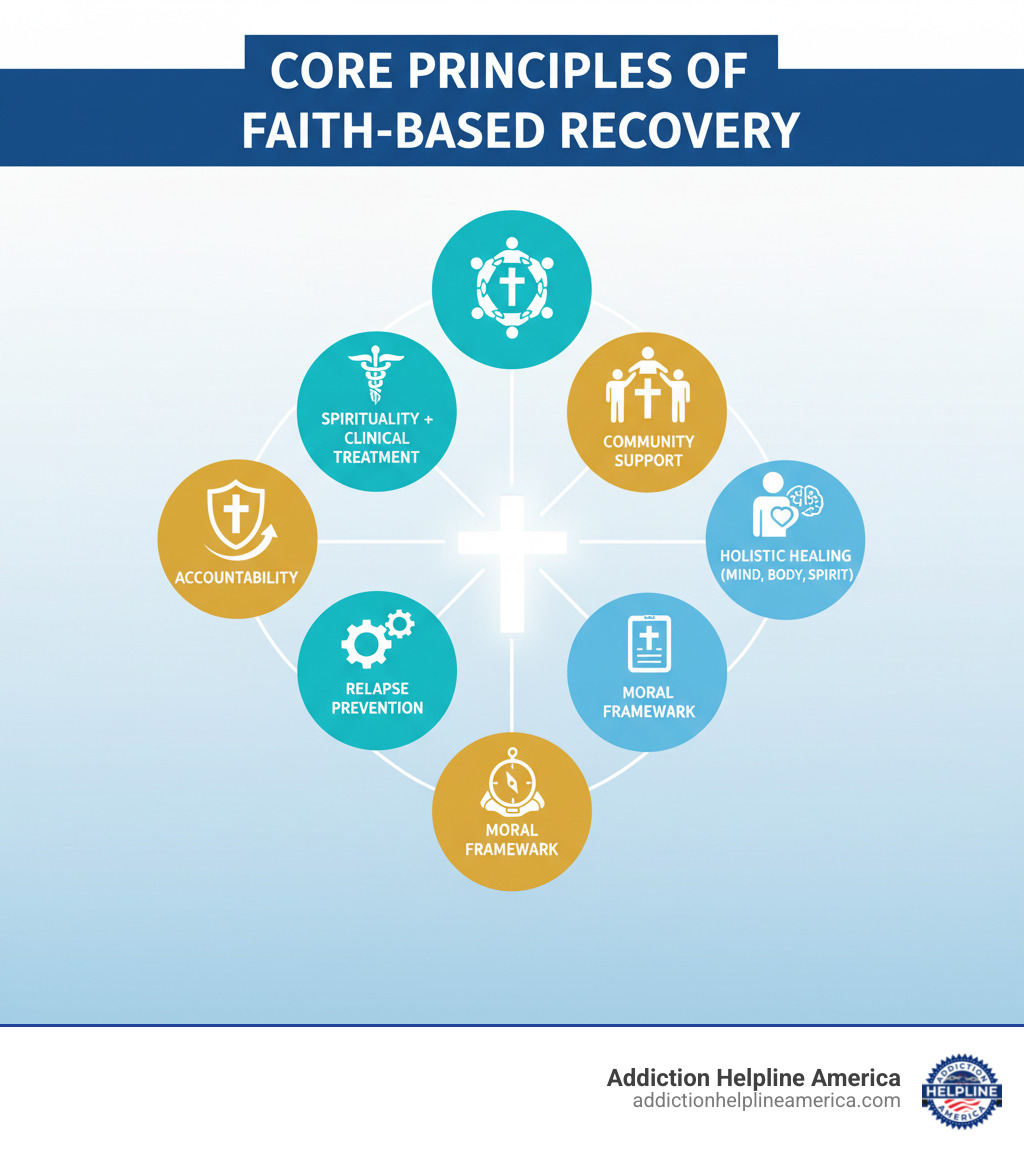
Why Faith-Based Recovery Can Be a Powerful Path to Healing
Faith based recovery merges traditional addiction treatment with spiritual practices and religious beliefs. These programs integrate prayer, scripture study, and spiritual counseling alongside evidence-based therapies. Available in settings from church support groups to residential centers, they draw from traditions like Christianity, Judaism, and Buddhism.
Key components often include:
- Spiritual Support: Recovery-friendly faith communities and spiritual leaders.
- 12-Step Programs: Groups like Alcoholics Anonymous that emphasize surrender to a Higher Power.
- Holistic Treatment: Addressing mind, body, and spirit with clinical care and spiritual guidance.
- Community Connection: Built-in support networks and accountability partners.
- Evidence-Based Integration: Over 84% of studies show faith plays a positive role in recovery.
For those struggling with addiction, incorporating spiritual beliefs can provide the strength and hope needed to heal. Faith-based programs recognize that addiction affects the whole person—body, mind, and spirit—and that lasting recovery requires addressing all three.
At Addiction Helpline America, we connect individuals with faith-based resources that align with their beliefs and goals. Our team understands that spirituality can be a cornerstone of sobriety, and we guide you to programs that honor your faith and your need for effective, evidence-based treatment.
Faith based recovery vocab to learn:
What is Faith-Based Recovery?
Addiction is often a battle on multiple fronts—physical, mental, and spiritual. Faith based recovery addresses this reality by bringing traditional treatment methods together with religious or spiritual beliefs. Instead of treating addiction as only a medical condition, these programs address the whole person: body, mind, and spirit.
Understanding Spirituality vs. Religion
It’s helpful to know the difference between religion and spirituality. Religion typically refers to an organized system of beliefs and practices shared by a community (e.g., Christianity, Judaism). Spirituality is more personal—it’s about your connection to something greater than yourself and your search for meaning.
Some faith based recovery programs follow a specific religious path, while others take a more open spiritual approach. For example, Alcoholics Anonymous emphasizes spirituality as each person understands it, without requiring adherence to a particular religion.
The Role of Faith Communities in Recovery
Faith communities play a powerful role by creating recovery-friendly environments where people are welcomed without judgment. They offer support services like sponsorship, recovery pastors, and support groups, often using faith-infused versions of the 12-Step framework.
The community support provided by these groups directly counters one of addiction’s most dangerous elements: isolation. Being part of a faith community means having people who check in, offer encouragement, and provide a sense of belonging. This combination of spiritual guidance and genuine human connection can become the foundation for lasting change. For more on this topic, you can explore more info on the role of spirituality in recovery.
The Role of Spirituality in Addiction and Recovery
For many, spirituality becomes a lifeline in recovery, addressing the profound emptiness that often fuels addiction. By finding a spiritual foundation, individuals find hope, purpose, and genuine connection.
Spirituality provides a vision for a meaningful future, a moral framework for healthier choices, and the healing gift of forgiveness from past guilt and shame. It also offers practical coping mechanisms for daily challenges. Instead of turning to substances, individuals learn to rely on healthier sources of comfort and strength.
Key spiritual practices include:
- Prayer and meditation: These tools are backed by science, with studies showing they can reduce pain sensation, alter brain activity related to emotional control, and be as effective as antidepressants for some people.
- Scripture study: Sacred texts offer wisdom and comfort, showing that struggles with human weakness are timeless.
- Community belonging: Faith communities counter the isolation and secrecy where addiction thrives, offering acceptance and understanding.
These elements are integrated into faith based recovery programs through daily spiritual practices like devotionals, group prayer, worship services, and spiritual counseling. Many programs also emphasize service to others, which shifts focus outward, builds humility, and creates purpose.
The Psychological Impact of a Spiritual Approach
The benefits of spirituality are measurably psychological. Research shows that people with higher levels of spirituality often experience:
- Reduced anxiety and depression
- Increased optimism and self-esteem
- Improved self-efficacy (confidence in one’s ability to succeed)
- A positive identity shift, moving from seeing oneself as an “addict” to a person with inherent worth.
This connection to a Higher Power provides a stable anchor of unconditional love and acceptance, which can be the difference between merely surviving and truly thriving in recovery. For more insights, explore More info on the role of spirituality in recovery.
At Addiction Helpline America, we understand that spirituality is personal. We can help you find a program, whether rooted in a specific faith or a broader spiritual approach, that fits your journey.
Types of Faith-Based Interventions and Programs
Faith based recovery includes a rich landscape of programs, from weekly support groups to intensive residential centers. What they share is a commitment to integrating spiritual principles with proven recovery strategies.
Common Program Types
- Group Support Programs: These are the most accessible form of support. Groups like Celebrate Recovery (a Christ-centered 12-Step program for all “hurts, hang-ups, and habits”) and New Life Christian Recovery Groups meet regularly to share struggles and victories. Spiritually-based programs like Alcoholics Anonymous (AA) and Narcotics Anonymous (NA) are also widely available, emphasizing reliance on a “Higher Power” of one’s own understanding.
- Residential Recovery Options: For more intensive care, residential programs like Teen Challenge USA provide long-term, immersive environments that combine spiritual discipleship with counseling and life skills training.
- Outpatient Groups: These offer a flexible alternative, allowing individuals to live at home while attending regular therapy and support meetings. This structure helps people practice recovery skills in real-world settings.
- Mentorship Opportunities: Many programs emphasize sponsorship, where a newcomer is guided by someone further along in their recovery. This one-on-one relationship provides personal accountability and wisdom.
Here’s a table comparing different approaches within faith based recovery:
| Approach Type | Core Philosophy | Key Features | Examples (US-based) |
|---|---|---|---|
| Christian-Inspired | Christ-centered healing, biblical principles, spiritual growth | 12-Step adaptation (e.g., Celebrate Recovery), scripture study, prayer, worship, spiritual counseling | Celebrate Recovery, New Life Christian Recovery Groups, Teen Challenge, Mountain Valley Recovery (Utah) |
| Spirituality-Based (General) | Belief in a Higher Power, spiritual awakening, community support | 12-Step principles, anonymity, sharing experiences, emphasis on personal spiritual growth (not specific religion) | Alcoholics Anonymous (AA), Narcotics Anonymous (NA) |
| Jewish-Inspired | T’Shuvah (repentance), ethical teachings, community responsibility | Integration of Jewish spirituality, prayer, study of sacred texts, cultural relevance | Beit T’Shuvah (California) |
| Islamic-Inspired | Principles of Islam, submission to God, community (Ummah) support | Islamic teachings, prayer (Salat), study of Quran, community fellowship, purification | Millati Islami World Services |
| Buddhist-Inspired | Mindfulness, compassion, Four Noble Truths, non-attachment | Meditation, mindfulness practices, ethical living, understanding suffering, secular-friendly | Buddhist Recovery Network |
| Native American-Inspired | Traditional Indigenous teachings, cultural practices, spiritual connection to nature | Sweat lodge ceremonies, talking circles, storytelling, connection to ancestral wisdom, community healing | Wellbriety Movement |
Exploring Different Spiritual Traditions
- Christian-Inspired: These programs use a Christ-centered approach, with the Bible as a guide. They adapt the 12 Steps to align with Christian theology, emphasizing concepts like confession, forgiveness, and divine strength for “heart-level change.”
- Jewish-Inspired: Programs like Beit T’Shuvah are rooted in the concept of T’Shuvah (repentance or “return”). They emphasize community responsibility (kehillah), ethical teachings from the Torah, and contemplative practices.
- Other Traditions: The spectrum of faith based recovery is broad. Buddhist-inspired recovery uses mindfulness and meditation. Islamic-inspired recovery emphasizes submission to Allah and community (Ummah). Native American-inspired recovery, like the Wellbriety Movement, uses traditional wisdom and cultural practices such as talking circles and sweat lodges. While practices vary, the core principles of seeking meaning, community, and personal growth are universal.
Effectiveness and Considerations in Faith-Based Recovery
Choosing a recovery path is a personal decision. While faith based recovery offers unique strengths, it’s important to weigh its benefits and challenges to ensure it aligns with your needs.
Research on Effectiveness
The scientific community increasingly recognizes the positive impact of faith on recovery. Key findings include:
- Over 84% of scientific studies show that faith plays a positive role in addiction prevention or recovery.
- Approximately 73% of U.S. addiction treatment programs include a spirituality-based element.
- One study found that increased religiosity during treatment was associated with 55.4% higher odds of abstinence afterward.
- Higher levels of spirituality are consistently linked to increased optimism, improved self-esteem, and lower rates of depression.
For more details, you can review Scientific research on faith-based interventions.
Potential Benefits
- Built-in Community: Faith groups offer a ready-made support network, reducing the isolation that fuels addiction.
- Meaning and Purpose: Spiritual beliefs provide a framework for understanding life and a reason to pursue sobriety.
- Moral Guidance: Faith traditions offer a moral compass for rebuilding integrity and making healthier choices.
- Holistic Healing: These programs address the spiritual dimension of addiction alongside the physical and psychological aspects.
- Accessibility: Many faith-based support groups are free or low-cost, making help widely available.
Challenges and Ethical Considerations
It’s also important to be aware of potential challenges:
- Judgment or Exclusion: Not all faith communities are equally welcoming. It’s vital to find a compassionate and accepting environment.
- Alignment with Medicine: Faith should complement, not replace, evidence-based clinical treatment. The best programs integrate both.
- Coercion Concerns: In mandated programs, feeling forced into religious practices can undermine genuine healing.
- Staff Credentials: Quality can vary. Inquire about the clinical and spiritual credentials of the staff.
- Transparency: A good program is upfront about its religious requirements and its inclusivity of different beliefs.
At Addiction Helpline America, we help you steer these considerations to find a program that honors your faith while providing the clinical support necessary for lasting recovery.
How to Find Faith-Based Recovery Support
Finding the right faith based recovery support can feel overwhelming, but many resources are available to guide you.
Starting Points for Your Search
- Local Faith Communities: Your local church, synagogue, mosque, or temple is a great place to start. Many host support groups like Celebrate Recovery or have spiritual leaders who can connect you with local resources. Look for communities that identify as “recovery-friendly.”
- Online Program Locators: The internet makes finding support easier. Use locators for specific programs like Celebrate Recovery (crlocator.com) or New Life Groups (newlife.com/groups/meetings/). SAMHSA’s general treatment locator (findtreatment.samhsa.gov) can also help you find centers, which you can then ask about their spiritual components.
- National and Government Resources: The HHS Center for Faith-based and Neighborhood Partnerships provides guidance for communities. For immediate help, the 988 Suicide & Crisis Lifeline offers 24/7 support.
How Addiction Helpline America Can Help
This is where Addiction Helpline America excels. We maintain a vast network of treatment centers across all fifty states and specialize in matching people to the right program. We understand that your spiritual beliefs are a core part of your recovery, not an add-on.
Our team provides free, confidential guidance to help you find a faith based recovery program that aligns with your values and clinical needs. We can help you steer the options, whether you’re looking for a Christian-inspired residential program or an outpatient group that respects diverse spiritual paths.
Questions to Ask a Program
Before committing, ask potential programs these key questions:
- What are the credentials of your clinical and spiritual staff?
- How do you integrate evidence-based therapies with spiritual guidance?
- What does the daily integration of faith look like (e.g., prayer, worship)?
- What is your policy on Medication-Assisted Treatment (MAT)?
- Is the program inclusive of people from different faith backgrounds or no faith?
Asking these questions will help you make an informed choice and find a program where you feel supported and respected.
Conclusion: Finding Your Path to Healing
Recovery from addiction is a personal journey that touches body, mind, and spirit. For many, faith based recovery provides a path to heal on all three levels, offering hope, a moral compass, and a supportive community when it’s needed most.
The landscape of faith-based support is diverse, with approaches rooted in Christian, Jewish, Buddhist, Islamic, and Native American traditions, among others. Research confirms the benefits of this approach, from a renewed sense of purpose to a greater chance at lasting sobriety. Many of these resources are also low-cost or free, making them highly accessible.
However, the right fit is crucial. The most effective programs are those that align with your personal beliefs and combine spiritual guidance with proven, evidence-based clinical treatment. It’s important to find a welcoming environment and ask questions to ensure the program meets your needs.
You don’t have to steer this alone. At Addiction Helpline America, we have helped thousands of people find recovery programs that match their unique needs and beliefs. Our guidance is free, confidential, and personalized. We can connect you with options from our extensive network of treatment centers across the country.
Reaching out for help is a sign of strength. Recovery is possible, and a program that honors your spiritual journey can make all the difference.
If you are in crisis, please contact the 988 Suicide & Crisis Lifeline. When you are ready to explore your recovery options, Addiction Helpline America is here to help you take the next step.
Our helpline is 100%
free & confidential
If you or someone you care about is struggling with drug or alcohol addiction, we can help you explore your recovery options. Don’t face this challenge alone—seek support from us.
Programs
Resources
Will my insurance
cover addiction
treatment?
We're ready to help
Find the best
drug or alcohol treatment
center
Are you or a loved one struggling with addiction? Call today to speak to a treatment expert.
















